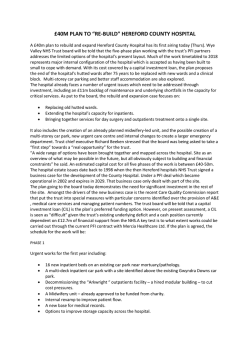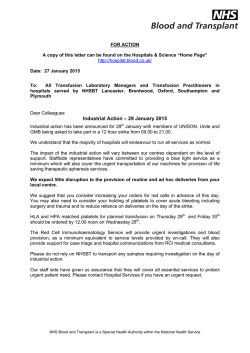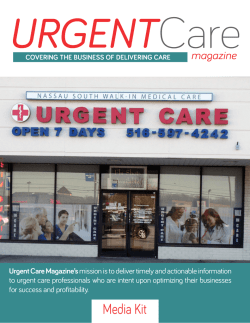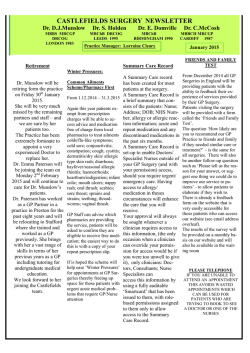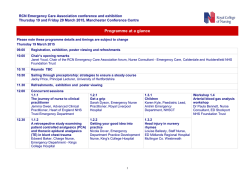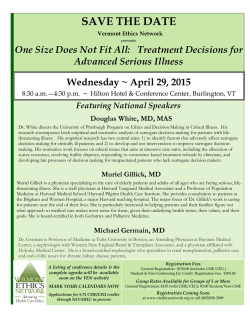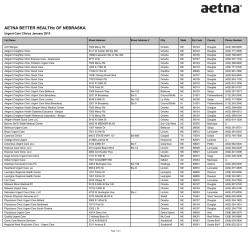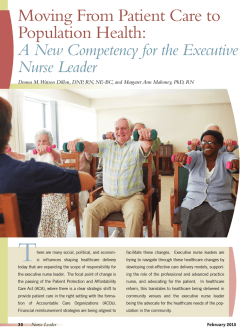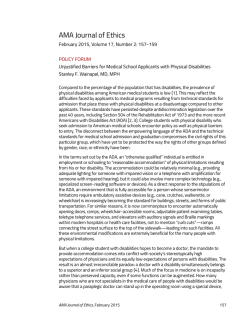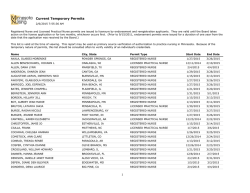
Urgent Care Brochure - Misericordia Health Centre
URGENT CARE PATIENT GUIDE Information for Patients and their Families Minor Accidents, Pain and Illness Can Happen Anytime Misericordia’s Urgent Care Centre offers assessment and treatment 24 hours a day, specializing in non-lifethreatening medical emergencies to members of the community. Urgent Care is a place where you and your family will receive medical treatment for your non-urgent medical concerns backed by our core values of caring, respect and trust. Our emphasis is on providing the best possible care because even if a health problem isn’t life threatening, it still needs to be treated properly. We can help with conditions such as: • Falls with injuries • Emotional problems • Bruisings • Flu symptoms • Abscesses • Anxieties • Migraine headaches • Constipation • Coughs • Rashes • Eye problems • Asthmas • Sprains • Minor burns • Earaches • Vomitting • Nosebleeds • Fevers • Diarrhea • Sore throats • Cuts • Broken Bones • Urinary problems We understand that visiting Urgent Care can be a stressful experience. We’d like to help make your visit as easy as possible by helping you understand what to expect while you’re with us. Please ask any of the medical staff if you require any further information or have any questions prior to leaving the health centre. STEP ONE: Triage When you arrive at Urgent Care, please approach the triage area and have a seat in the red chairs across from the triage desk. Patients are triaged according to the severity of their problem. When it is your turn you will be asked to sit at the triage/registration desk where the registration clerk will take your name and birth date. The triage nurse will take your blood pressure, temperature and pulse and ask you: • why you came to Urgent Care, • for a brief medical history, • for a list of all current medications and allergies. Registration After all necessary information has been given to the triage nurse you will be registered by the registration clerk who will ask you for your Manitoba Health Card numbers and other important personal information including your address, phone number, emergency contact and the name of your family physician. Your initial assessment tells the triage nurse how ill or how badly injured you are and how quickly you should be seen. The triage process also determines whether you will be seen in the General Treatment Area – open 24 hours a day, seven days a week – or the Minor Treatment Area – open 9 a.m. to 10 p.m. seven days a week. Waiting Time Display Boards Every Emergency Department waiting room is equipped with an electronic wait time display board which provides information on the following: • Real-time estimates for wait times • Number of patients in the waiting room • Average time patients currently in the waiting room have been waiting Waiting To Be Seen It is our goal to see every patient as soon as we possibly can. Urgent Care does not see their patients on a first come, first served basis. Some patients are more ill or injured and must be treated first. During longer wait times, a nurse will be reassessing patients’ conditions at regular intervals. Please talk to the nurse at any time: If you are experiencing increased pain, or your condition has worsened since arrival • • Before having anything to eat or drink as you may need tests which require an empty stomach • If you need to go to the bathroom. You may need to give a sample. • If you are leaving the waiting room for any reason Do not leave the UC without being treated. Should you decide to leave without being seen by a physician, please talk to a nurse first. If determined appropriate for your care, a nurse may send you for an X-ray, to have blood drawn or ask for a urine sample – which can help to decrease the length of time you will need to be here after you see a doctor. STEP TWO: The Exam You will be taken into an exam room, where a nurse may ask you more detailed questions about your health condition. If required, the nurse may start an Intravenous (IV), take a blood sample or ask you for a urine sample. Urgent Care physicians may be with other patients, which means you may have to wait until a doctor can see you. If required you may be assessed by other members of the interprofessional team such as Home Care or a social worker. A physician will examine you and discuss your concerns with you. Please take this opportunity to review your medications, past medical history and any other concerns. For future Urgent Care visits please bring a complete list of medications you take at home, including the dosage and how often you take the medication. Tests and X-Rays Tests and X-rays assist the physician in determining the appropriate plan of care for you. Lab results typically take one to two hours, depending on the type of test. While you are waiting for results you may be asked to wait in another room within Urgent Care to allow the next patient’s treatment to begin. Some tests or procedures may need to be done at another centre. After the physician reviews your results, s/he will develop a plan of care that will be discussed with you. We encourage you to ask questions at any time regarding your care. Transfer to another facility Some illnesses and injuries may require you to be transferred to another facility for admission or consultation with a specialist. Your physician or nurse will discuss this with you and your family. All necessary arrangements will be made by the medical staff and they will keep you updated. If you are being transferred for admission to another facility, send your valuables – including jewelry - home with your family or friends for safe keeping. STEP THREE: Leaving Urgent Care You will be given instructions prior to leaving Urgent Care, including the name of the physician who treated you. Patient Discharge Checklist Do you understand your diagnosis? Have you received your discharge instructions and are you aware when you need to seek medical care or return to Urgent Care if your condition changes? Did you receive a prescription and instructions on the medication? Do you have any follow up appointments? If so where, with which physician or service? Will the physician’s office or service be calling you or do you have to contact them? Do you have any additional tests to be done as an outpatient? Has your next of kin been notified of your discharge if appropriate? Do you have appropriate transportation home? Do you have a caregiver available upon discharge? Do you have keys to enter your home with you? Do you have appropriate clothing for the current weather conditions? Do you have any concerns about being discharged? Please ask any of the medical staff if you require any further information or have any questions prior to leaving Urgent Care. Other Information for Patients and Families Cafeteria The Miz Café is located at the Wolseley door entrance of Misericordia Health Centre. The café is open Monday to Friday from 7 a.m. to 6:45 p.m. with the grill fired up from 7:30 a.m. to 5:30 p.m. The café closes at 3 p.m. Saturday and Sunday. Security Misericordia Health Centre’s Security Department is available 24 hours a day, seven days a week. If you require assistance, security can be contacted 7:30 a.m. – 3:30 p.m. Monday to Friday at 204-788-8301. If you require security outside of these hours, please call our switchboard at 204-774-6581 and ask for security assistance. Parking Misericordia’s parkade, with hourly and daily rates, is located at 25 Sherbrook Street. Gift Shop The Shop is located on the main floor of Misericordia Health Centre near the Wolseley Avenue main entrance. The Shop is open 10 a.m. to 7 p.m. daily, depending on volunteer availability. Spiritual Care: Requests to see a spiritual-care provider may be made in person, through the operator, or the health-care provider you may be seeing for treatment. The Urgent Care team may initiate a referral on your behalf. Code of Behaviour/Conduct Support Services We can also help arrange non-medical support services if you require them, such as: Home Care, nutritional services, respiratory therapy, social work and more. Patients, visitors and staff all want to be safe in Urgent Care. Misericordia Health Centre has a policy of zero tolerance for violence. This means acts of violence, swearing, threats or verbal abuse will NOT be tolerated. Anyone who is violent or abusive will be asked to leave. Visitors We understand and support your need for family and friends to assist you, but for safety reasons we can only allow one or two visitors with you in the treatment area at any time. Occasionally we may need to ask them to leave during your treatment. 204.774.6581 • misericordia.mb.ca 99 Cornish Avenue, Winnipeg, Manitoba r3c 1a2
© Copyright 2026
